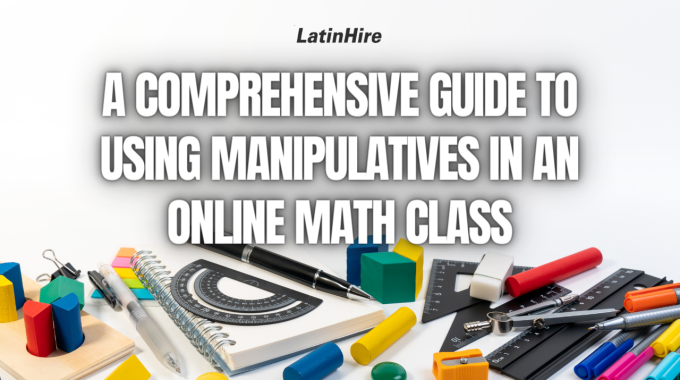In last week’s article, we looked at introducing quantum numbers using a condo analogy as…

A Comprehensive Guide to Using Manipulatives in an Online Math Class
Math can be a challenging subject for many students because of its abstract nature and complex concepts. In traditional classrooms, teachers often use physical manipulatives to provide students with visual and tangible tools to explore mathematical ideas.
However, in the realm of online learning, the absence of these hands-on resources can be a significant hurdle for both teachers and students. Fortunately, over the years, advancements in technology have introduced online classrooms to virtual manipulatives. Various websites offer interactive simulations and digital tools that replicate the experience of using traditional math manipulatives.
In this article, we’ll take a look at the benefits of incorporating online math manipulatives in your teaching repertoire and highlight some of the most effective tools available on the internet.

Benefits of Online Math Manipulatives
1) No shortage of supply: Traditional classrooms may have limited sets of manipulatives to be shared among the students. In online classes, each student can have their own set as they can access the manipulatives through their own computers. There’s also no worry of pieces going missing in the online setting.
2) Interactive Engagement: Online math manipulatives offer interactive features that encourage student participation and collaboration. Whether it’s dragging virtual blocks to model fractions or turning the hands of a clock to tell time, these tools transform passive learning into a hands-on experience through the screen.
3) Conceptual Understanding: Through experimentation with the online math manipulatives, students can develop a deeper conceptual understanding of mathematical principles. By actively working with digital manipulatives, they can discover patterns, make connections, and gain insight into the underlying logic of mathematical concepts.
4) Personalized Learning: Many online math manipulatives come with customizable settings that allow educators to tailor activities to meet the individual needs of students. Whether it’s adjusting difficulty levels, or providing feedback in real-time, these tools allow teachers to differentiate instruction and address the diverse learning needs within their classroom.

Popular Websites for Online Math Manipulatives
1) Geogebra: Geogebra is a versatile tool that offers dynamic geometry, algebra, and calculus software for math education. With its interactive interface, students can explore geometric constructions, graph functions, and manipulate mathematical objects in real-time.
2) Didax: Didax’s online platform provides access to various interactive tools such as base-ten blocks, fraction tiles, and geometric shapes, allowing students to engage in hands-on activities to learn basic math concepts.
3) Toy Theater: Toy Theater has a collection of virtual math manipulatives, including counting blocks, number lines, and money counters. With its engaging and user-friendly interface, students can easily access these virtual manipulatives to reinforce concepts such as addition, subtraction, multiplication, and division.

4) Desmos: Desmos is a powerful graphing calculator that provides students with a platform to visualize mathematical concepts through graphing, modeling, and interactive activities. From plotting functions to exploring transformations, Desmos offers a range of tools to support mathematical exploration and problem-solving.
5) Coolmath4kids: Coolmath4kids.com is a popular website that offers a variety of interactive math games, puzzles, and activities designed specifically for young learners. The math manipulatives include 10 frames, base ten blocks, number lines and pattern blocks. This site is not strictly manipulatives, and the games and activities provide students with opportunities to practice math skills in a fun and engaging way.
6) Braincamp: Braincamp is an online platform that offers interactive math manipulatives and educational games designed to enhance critical thinking and problem-solving skills. With a focus on engaging visuals and hands-on activities, Braincamp provides students with opportunities to explore mathematical concepts in a dynamic and immersive way. Braincamp includes algebra tiles, base ten blocks, clocks, color tiles, fraction circles and many more.
7) Math Playground: Math Playground offers a wide selection of interactive math games, puzzles, and activities for students of all ages. From basic arithmetic to advanced problem-solving, Math Playground provides engaging tools to reinforce mathematical concepts and skills, such as ratios, fractions, decimals, and many more. This website also has customizable features for teachers to create and track assignments.
Do you use digital manipulatives in your online math lessons? If so, let us know about your experiences in the comments below!



